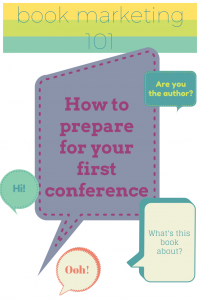This post is part of an ongoing series at The Open Book answering questions about book marketing and publicity.
With the 2015 American Library Association (ALA) conference just around the corner, many first-time authors are probably starting to get nervous, wondering what’s in store for them. Going to your first trade conference, book event, or signing can be incredibly daunting. It marks a transition from the very private and solitary process of creating a book to the very public process of interacting with readers directly and getting your book out into the world. This is by no means easy, but being in a public space with your book can be incredibly rewarding. Here are a couple things to keep in mind as you make the transition:
1. Your primary goal should be to let people know about  your book. Signing at a well-attended event like ALA is as much about visibility as it is about book sales. Your goal should be to engage with as many people as possible to let them know who you are and what your book is about. Sales often come naturally out of this engagement; and if they don’t, don’t be discouraged. Many book sales don’t happen on the show floor, as most librarians and other professionals order books through their systems. But a good conversation with a librarian can lead to copies being ordered for his/her branches.
your book. Signing at a well-attended event like ALA is as much about visibility as it is about book sales. Your goal should be to engage with as many people as possible to let them know who you are and what your book is about. Sales often come naturally out of this engagement; and if they don’t, don’t be discouraged. Many book sales don’t happen on the show floor, as most librarians and other professionals order books through their systems. But a good conversation with a librarian can lead to copies being ordered for his/her branches.
2. Have something to hand out with your information on it. Many publishers create bookmarks or postcards for new titles – you should ask your publisher before the signing what materials they will be bringing. If they are not bringing handouts, or even if they are, you may also want to create your own postcard or brochure with more information and your own contact information. If you are looking to build your school visit business, consider creating a brochure about what you offer. This is a perfect opportunity to spread the word.
3. Come up with a one-liner “elevator pitch” about your book. The most common question people will ask if they stop at your signing is, “What is this book about?” Even though you have labored over your book for a very long time, this is sometimes a hard question to answer if you haven’t practiced. Before the conference or signing, have friends and family help you shape a one-sentence quick description of the book that you can offer to pique the interest of passersby.
4. Share more if someone looks interested. Your one-liner should draw people in, but if they are lingering and paging through your book, don’t be afraid to offer more information. Tell them about the process, the research you did, or what inspired you to write this story. Ask them questions about their interest and to build connections (“This book is about a jazz musician. Are you a jazz fan?”; “This book takes place in California – are you from California?”). These lines may sound cheesy, but delivered earnestly they can form a welcome bridge to further conversation.
5. Don’t be afraid of the actual ask. If you’ve been engaging with someone for a while and they seem reluctant to put your book down, it’s OK to ask them, “Would you like a signed copy?” For some authors, this can be a little scary, but the more you do it, the easier it will get. Some people will say yes; some will say no. Remember that it’s not a judgement on you or the quality of your book either way. If they say no, follow up by handing them a postcard or brochure to take with them. That book sale may come at a later time.

6. When you are signing, be fully present – even during lulls. There are so many things going on at once during major conferences that competition is fierce, and you may well find yourself with a lull during your signing when no one is at your table. This is normal, and even very experienced authors sometimes face this. Don’t feel bad or be embarrassed – this is just a reality of book signings. During quiet periods, you can talk to the staff helping with your signing but be sure to stay open and receptive – i.e. don’t retreat to your phone, or turn away from the aisle. You never know when someone interested may wander past, and if you’re checked out, you will likely miss them.
7. One person brings more. It is a truth universally acknowledged that crowds breed more crowds. You may go a few minutes with no one at your signing, followed by a line of 7 or 8 people all at once. One interested person will attract others who are wondering what’s going on. Embrace this chaos. If you do have a crowd forming, respect the line and make sure you’re not spending too much time talking to any one person. If someone wants to have a long conversation with you, politely tell them, “I’m sorry, I need to sign for the next person but perhaps we can continue this conversation at a later point.”
For some great insights from the author end, I encourage you to read this series we asked experienced authors for their advice on planning a successful book signing:
How to Plan a Successful Book Signing Part I
How to Plan a Successful Book Signing Part II
How to Plan a Successful Book Signing Part III
Apart from these things, just remember to bring your lucky signing pen and you’ll do fine! The more events you do, the more comfortable you’ll get, and you may find that these opportunities to interact with readers inspire and motivate you as a creator in new ways.
More Marketing 101 posts:
Five things to do before your book is released
What to put on your author website


One thought on “Marketing 101: How to Prepare for Your First Conference”
Comments are closed.